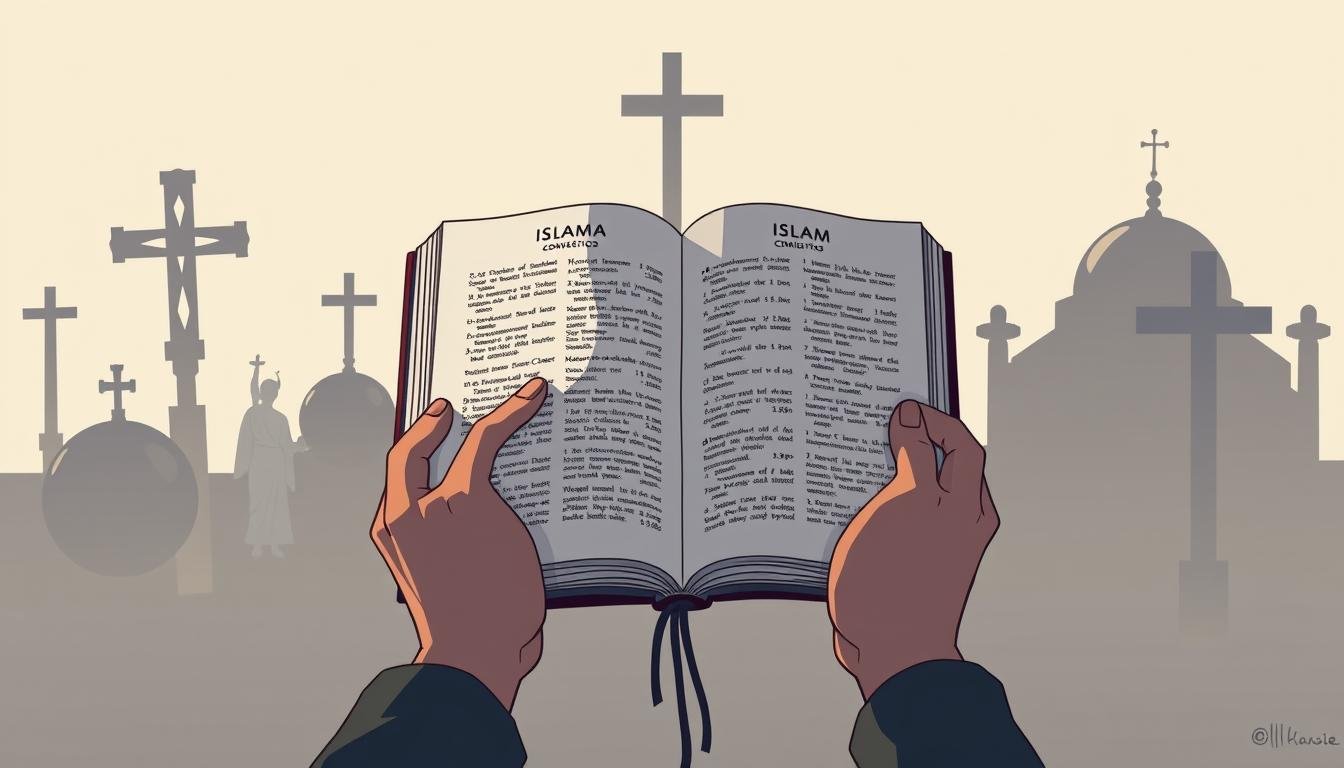Imagine standing at a crossroads, torn between faiths. This is true for millions, from Malaysia’s 9% Christians to secret Iranian churches. My journey in interfaith dialogue has shown stories like Rooney Rebit’s.
Rebit, a Malaysian man, converted to Christianity in 1999. But courts questioned his Islamic identity. This shows the clash between Islam’s rules on leaving faith and the right to choose.
Lina Joy’s case in 2007 shows the risks. She was rejected for changing her faith from Muslim to Christian. The Quran says there should be no force in religion. But scholars argue about if this means you can change your faith.
In the U.S., 22% of those leaving Islam become Christian. Yet, half give up on religion altogether. These choices are made under laws that punish leaving faith, from counseling to jail.
What does it mean to choose a new faith? For some in Germany or the U.S., it changes who they are. But in places like Malaysia, laws can block this choice, even with freedom of religion guaranteed.
I believe in honest talks about these issues. Can laws respect both sacred texts and human rights? This article looks at Islamic teachings, global data, and personal stories to answer this big question.
Understanding Religious Conversion in Islamic Theology
At the heart of Islamic theology is riddah—the act of leaving Islam. This idea shows how faith is sacred in Islam. Apostasy is seen as a spiritual break, not just a choice.
The Quran shows a paradox. Some verses talk about the spiritual effects of leaving Islam. But others, like Sura 2:256, say “There is no compulsion in religion.”
“Who desires another religion than Islam, it will not be accepted from him” (Quran 3:85).
The Concept of Apostasy (Riddah) in Islam
Riddah means a Muslim rejecting key beliefs. A famous example is Sam Solomon converting to Christianity in 2006. But, opinions on riddah vary.
Older scholars often took a strict view. But newer thinkers look at Quranic verses like 16:125. They suggest talking, not forcing, people to believe.
Quranic Verses Related to Faith and Conversion
Some verses, like 2:109, warn against being hypocritical. But 109:6 says, “You have your religion and I have mine.” This shows the Quran’s complexity.
For example, Sura 5:54 links leaving Islam to spiritual rebellion. But 49:13 celebrates different beliefs. The Quran’s words can be seen in many ways.
Different Interpretations Among Islamic Scholars
Older jurists often looked at punishment. They used Hadiths to support their views. But today, scholars like 2:256 to talk about freedom of religion.
This shows a big difference in views. It’s about how to understand the Quran. As people move between faiths, these debates are key to understanding each other.
Getting to know apostasy in Islam means looking at both the Quran and real life. By exploring these ideas, we can connect and respect each other’s beliefs. Jesus’ role in Islamic thought adds to these discussions, calling for more conversation.
Historical Context of Religious Freedom in Islam
Islamic history shows many views on religious freedom. Early empires like the Abbasids and Ottomans let Christians and Jews practice their faiths. They did this under dhimmi status, showing that Islamic law on conversion wasn’t always strict.
The Ottoman millet system was another example. It let religious minorities run their own communities. This showed tolerance, even when rules seemed strict.

Over time, debates about Sharia law and apostasy changed. Classical scholars argued over what punishment to give for leaving Islam. But, many places showed mercy to those who converted back.
In places like Andalusia and Persia, scholars like Al-Ghazali pushed for kindness. Even in medieval Egypt, people like Copts and Jews held important jobs. This showed that strict rules weren’t always followed.
Today, we see the mix of old and new ideas. In Egypt, old laws and new changes meet. While old texts suggest harsh punishments, reforms have made things better. But, social stigma remains.
Early Islam grew through trade and politics, not just force. The idea of “conversion by the sword” is not true. Medieval stories tell of only 270 Christian martyrs, showing most people lived together peacefully.
This history makes us think more about how old traditions meet modern rights. It’s a chance to understand the complex views on religious freedom in Islam.
Can a Muslim Convert to Christianity According to Islamic Law?
Islamic law on conversion is a big topic of debate. Old sharia law and apostasy rules often look at the Quran and Hadith. But, new views question strict rules. Let’s look at these ideas without bias.
Classical Interpretations of Sharia on Conversion
Old laws see apostasy as a big crime. Al-Shafi’i said apostasy is when someone openly rejects Islam after saying they believe. Hadiths, like the Prophet’s order to “kill him who changes his religion,” support harsh punishments. Cases like Malaysia’s Lina Joy show courts follow these rules today.
But, scholars like Ibn Taymiyyah said harsh penalties only apply if someone’s change causes trouble. They don’t count personal belief changes.
Contemporary Islamic Views on Religious Freedom
Today, some question if apostasy should mean death. Scholars like Muhammad Abduh point to Quran 2:256—“no compulsion in religion.” Egypt’s Al-Azhar now says only God judges faith, not courts.
While places like Saudi Arabia keep old laws, Indonesia’s top Islamic group said in 2005 that converting shouldn’t be punished by the state. These changes show a move towards respecting human rights in Islamic law.
The Principle of “No Compulsion in Religion”
Quran 2:256 tells us not to force religion. Early thinkers like Al-Ghazali said harsh punishments only for treason, not just changing beliefs. Today, Turkish scholar Fethullah Gülen says faith is about the heart, not laws.
This debate between old teachings and new ideas keeps changing how we talk about converting to Christianity from Islam.
Social and Family Implications for Muslim Converts
Leaving Islam can deeply affect personal faith and family ties. Cultural and religious pressures create unique challenges for those turning to Christianity. Many face broken relationships—30-50% lose inheritance, and 70% in strict homes face threats or violence.
“I’ve seen families reject members who convert—some lose homes, jobs, or even their names. Yet, the human spirit often finds resilience in unexpected places.”
Family reactions to conversion vary worldwide. In Europe, shame leads to ostracism. In the Middle East, converts face legal dangers. Women often suffer more due to patriarchal rules.
Building new support systems is key. Missionaries say 75% of converts seek help to blend faith and culture. Some join interfaith groups or online forums. Churches must be ready to support converts to avoid isolation.
Legal Status of Muslim Converts in Muslim-Majority Countries
In apostasy in Islam, laws for converts vary a lot. Islamic law on conversion is interpreted differently. This affects everything from jail time to being shunned by society. For example, in Jordan, insulting Islam can get you up to three years in jail or a big fine.
But the real punishment often goes beyond the law. Converts might lose their inheritance or have their marriages annulled. This shows the consequences of leaving Islam go beyond court decisions.
In places like Saudi Arabia and Afghanistan, leaving Islam can mean death. But, executions are rare. Instead, people might face mob justice or be shunned by their families.
In Egypt, the Supreme Administrative Court says converts can’t legally change their religion. This leaves many in a legal gray area. A 2010 Pew poll found that 84% of Egyptians think apostasy should be punished by death.
But, most of the time, people are punished more by social pressure than by the law. Legal systems and reality don’t always match up.
While 46 countries have laws against converting, some are very strict. For example, Brunei can execute people for leaving Islam. But, places like Tunisia or Albania are more welcoming. Here, converts face less danger and more acceptance.
These differences show that the system is changing slowly. Debates about religious freedom are growing. But, for many, the biggest danger is not the law but being rejected by society.
Theological Bridges and Differences Between Islam and Christianity
Both Christianity and Islam share a common root in Abraham. They honor prophets like Abraham and Moses. But, they differ in how they see Jesus. This is important for those looking to change their faith, like going from Muslim to Christian.
Both faiths have stories of prophets like Adam and Noah. They also share stories about Jesus. But, they see Jesus differently. The Quran talks about Jesus’ miracles and birth, but not as the Son of God.
In Christianity, 1 John 4:8 says:
“Whoever does not love does not know God, because God is love.”
This shows God’s love in Christianity. But, the Quran talks more about God’s mercy and justice. It doesn’t use the word “love” in the same way.

Shared Prophets and Stories
Both faiths see Jesus as a messenger. But Christians believe he is God in human form. Islam does not agree with this, sticking to the idea of one God.
For those changing their faith, it’s hard to understand these differences. It makes them question who they are.
Divergent Views on Jesus/Isa
In Islam, Isa is a prophet, not God. But, many who change their faith believe in the Trinity. This shows how changing faith can change how we see important stories.
The Quran says Jesus was not crucified. This is different from what Christians believe. It shows how each faith sees salvation in its own way.
Concepts of Salvation and Divine Nature
In Christianity, salvation comes through believing in Jesus. In Islam, it’s about following Allah’s laws. These ideas show a big difference between grace and works.
For those thinking about changing their faith, these ideas are important. They make us think about God’s justice and mercy.
Personal Testimonies: The Journey from Islam to Christianity
Stories of Muslim to Christian conversion show the deep challenges faced by people like Aasim. He is a Palestinian-American who started doubting his faith at six. He grew up in South Carolina, questioning for years, attending youth groups, and then found Christianity at a “Cola Wars” event.
Now, he works as a nurse’s aide. He shows how hard it is to mix old cultural roots with new beliefs.
Many converts say their converting from Islam was a slow process of questioning. They wondered how a loving God could punish those who leave. They found answers in Christian communities.
Aasim was baptized at ALIVE Wesleyan Church, with just ten people watching. This shows the bravery and loneliness of such a step. Studies show that over 65% of converts were influenced by friends, but 70% face family rejection.
“The love I found in Christianity felt like freedom,” Aasim shared, reflecting on his decision to leave Islam at 13. “But the cost was losing my childhood friends.”
Interfaith conversion stories also show big differences. While some Muslims believe in harsh punishments for leaving, converts find grace in the Bible. The 500 Arabic-speaking churches in the U.S. help communities where faith and culture meet.
Aasim’s story and many others remind us that changing beliefs is not just about ideas. It’s about finding peace in a broken world.
Resources and Support for Muslims Exploring Christianity
Changing from Islam to Christianity is a big step. It involves understanding new beliefs and facing social challenges. Academic resources like studies on conversion help a lot. They offer insights into the journey.
Support groups are there to help. They help people deal with doubts and accept new beliefs. It’s not a journey alone.
Interfaith Dialogue Organizations
Places like The City and local councils are great for talking. They are places where people can discuss without fear. Questions about salvation or scripture are welcome.
Resources like the Urdu Geo Version of the Bible help. They use languages and ideas that are familiar. This makes it easier for people to understand.
Books and Educational Materials
Books that compare stories or talk about Jesus’ resurrection are popular. Websites like Bible.com offer texts in many languages. But, some sites may have ads that are not good.
Choosing the right materials is important. It helps ensure that converts get information that is fair and respectful.
Community Support Groups in the United States
Churches and online groups provide safe places. In the U.S., they help people rebuild their identity. They share stories and offer care from pastors.
These groups also help with everyday problems. They deal with issues like family problems and legal issues. They make sure converts don’t feel alone.
FAQ
Can a Muslim convert to Christianity and remain part of their family?
What does Islam say about apostasy?
Are there legal consequences for converting from Islam to Christianity?
How do interfaith dialogues help those considering conversion?
What are some challenges faced by converts from Islam to Christianity?
Can Muslims who convert to Christianity find educational resources tailored for them?
How do shared prophets contribute to understanding between Muslims and Christians?
What are the emotional experiences typically reported by converts?

Embracing Faith, One Insight at a Time!
The teachings of the Quran have always guided my path. With a deep passion for Islamic knowledge, I strive to blend the wisdom of tradition with the relevance of today, making the timeless messages of Islam accessible and meaningful for everyone.
Muslim Culture Hub is my platform to share historical insights and thought-provoking articles, exploring both well-known and lesser-discussed aspects of Islamic culture and beliefs. My mission is to create an inclusive online space where everyone can learn, strengthen their faith, and connect with the profound message of Islam.
Join the journey!
May peace be upon you.








